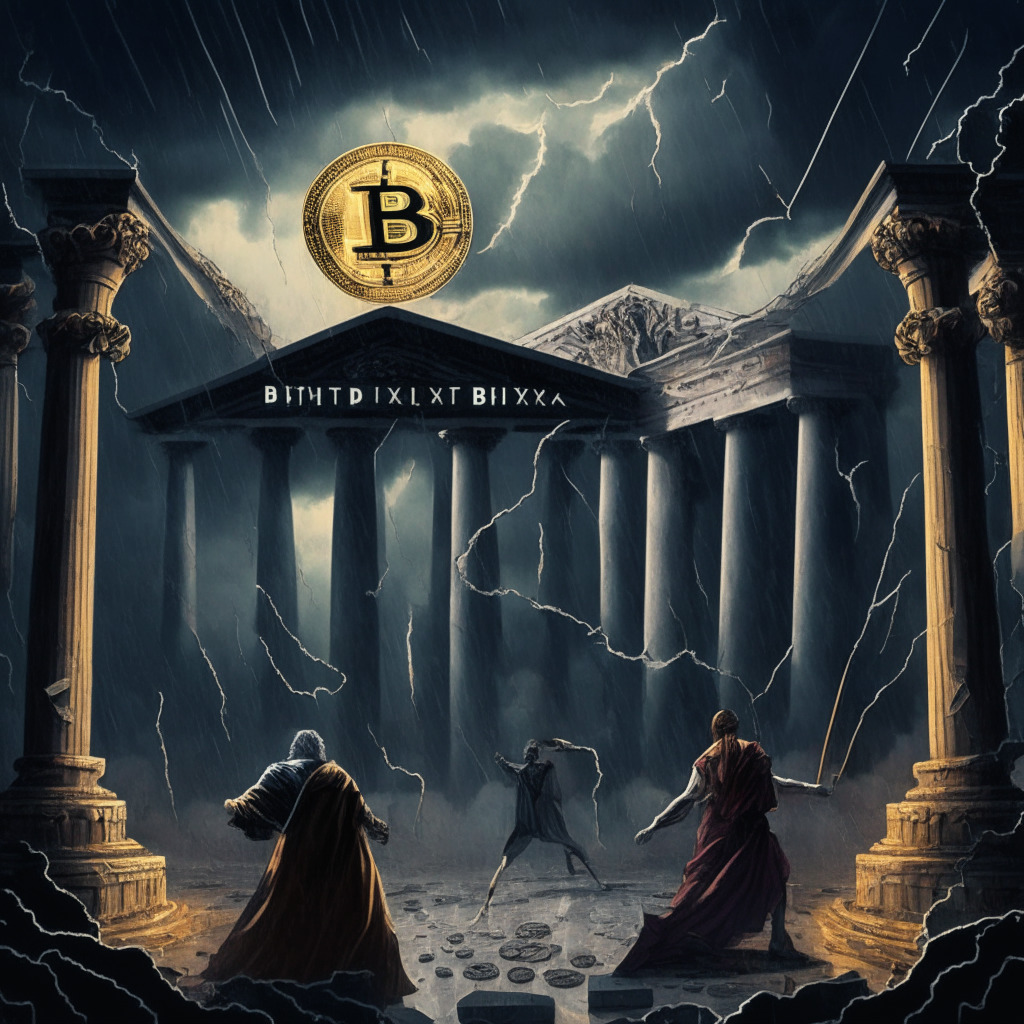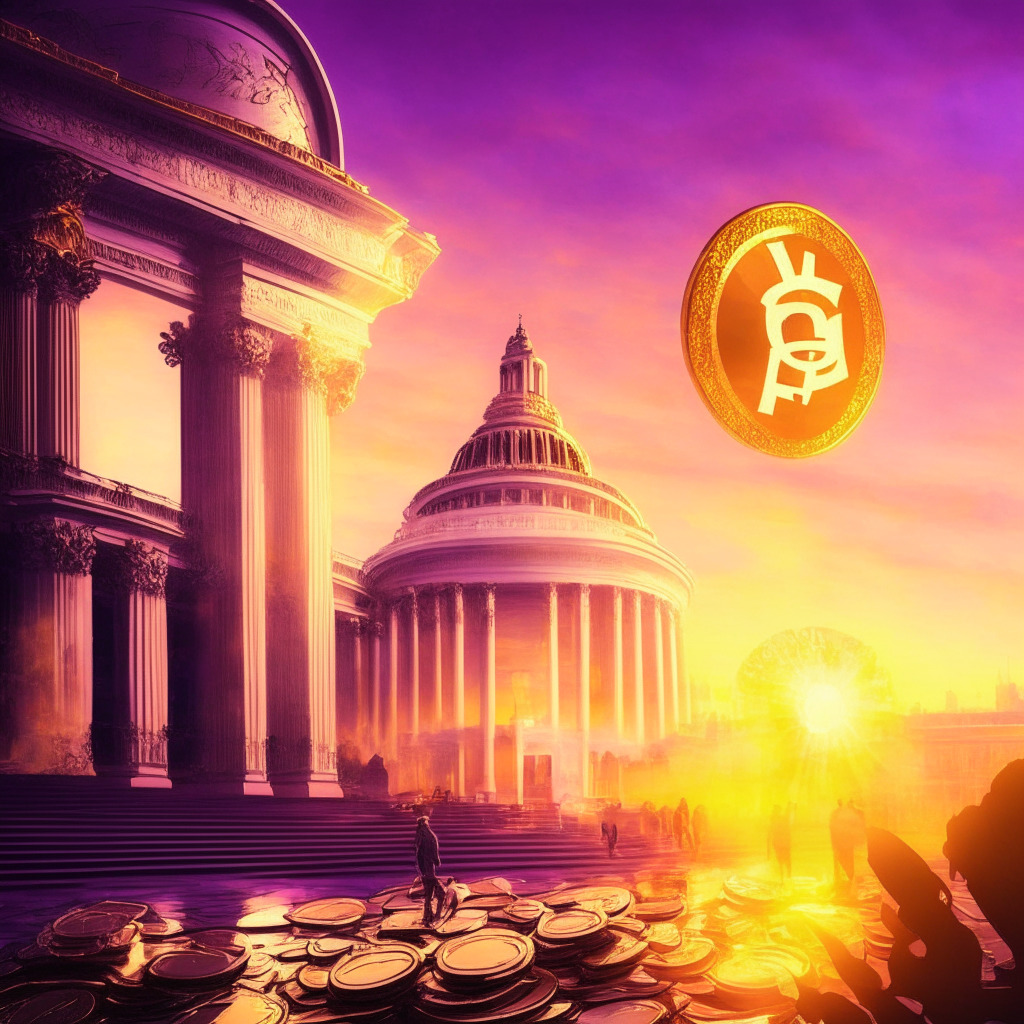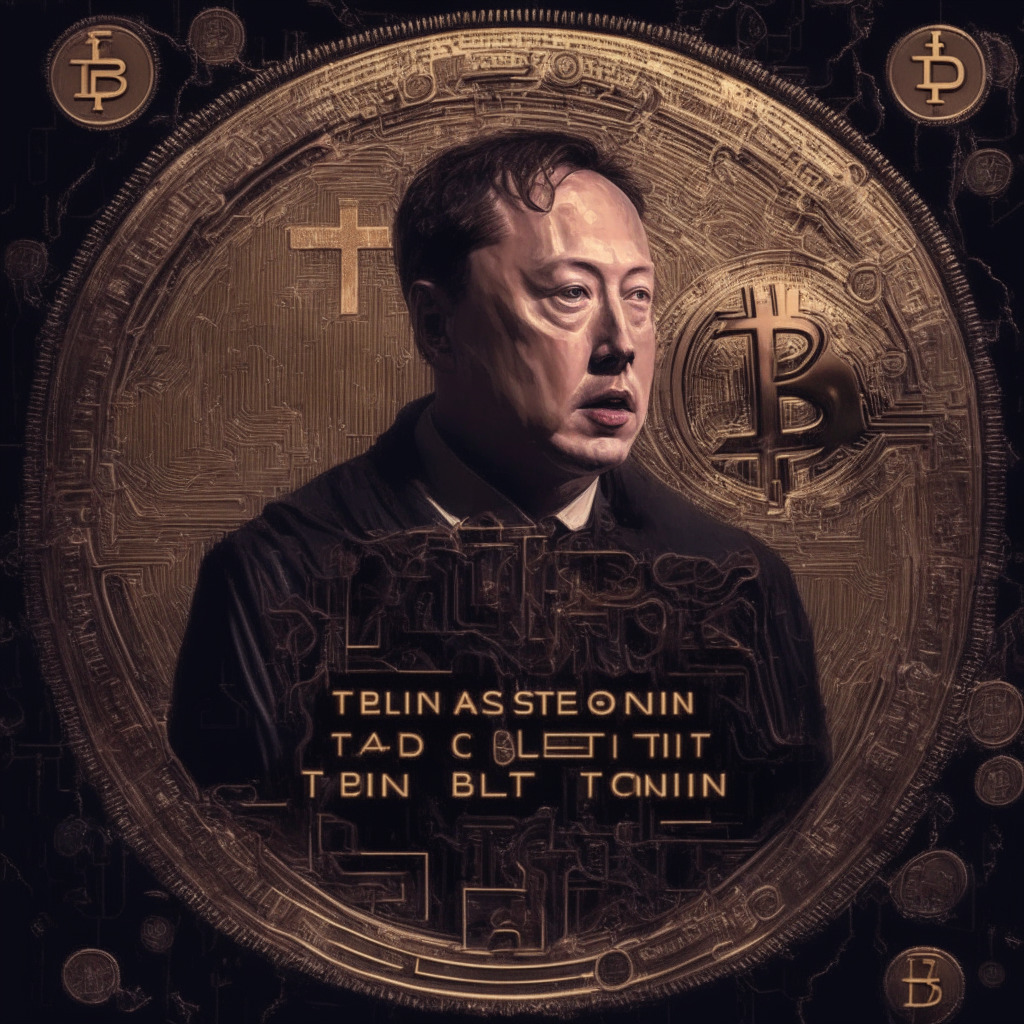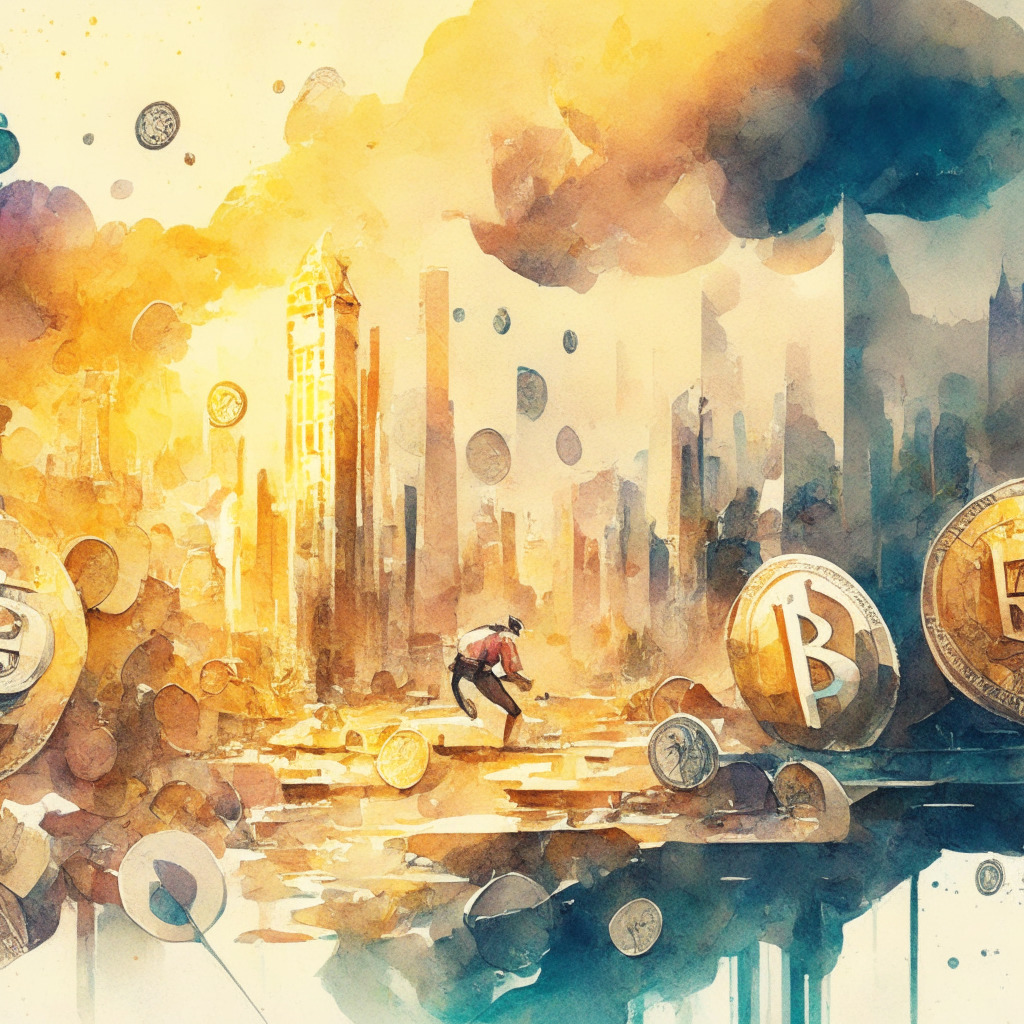The Winklevoss twins’ Gemini Foundation expands its offerings to non-US residents, now available in 29 jurisdictions such as Singapore, Hong Kong, and India. As it faces regulatory challenges in the US, Gemini focuses on offshore expansion and an Asian pivot to position itself as a global player in the crypto market.
Day: May 3, 2023
Bankrupt FTX Seeks $4B from Genesis: A Lesson in Crypto Safety and Future Growth
Bankrupt cryptocurrency exchange FTX attempts to recover $4 billion from bankrupt crypto lender Genesis, raising concerns about industry safety and stability. Critics call for stronger regulations, while enthusiasts see the situation as a valuable learning experience for improving practices and transparency.
Insider Trading in NFTs: OpenSea Case Sheds Light on Regulation Challenges & Market Integrity
The conviction of ex-OpenSea Product Manager, Nathaniel Chastain, for wire fraud and money laundering raises questions about insider trading in the NFT market and potential regulation. Chastain’s trial outcome could impact the classification of NFTs as securities, highlighting the need for a balanced approach in regulating digital assets to ensure market integrity and foster innovation.
Coinbase Accused of Exploiting Biometric Data: Navigating Privacy and Security in Crypto
Coinbase faces a class action lawsuit accusing it of violating Illinois’ biometric privacy law, by allegedly collecting customers’ facial and fingerprint scans without consent. This raises concerns about data security, user privacy, and compliance with regulations in the crypto industry.
Democratic Candidate Links Anti-Crypto Sentiment to Bank Failures, Sparks Debate
Presidential candidate Robert Kennedy challenges anti-crypto sentiment within the Democratic party, attributing regulatory agencies’ “war on crypto” to several bank failures in March. He criticizes the FDIC and SEC for targeting crypto and leaving banks as collateral damage while expressing concerns about the suspected “Operation Chokepoint 2.0” government conspiracy.
SEC Withdraws Digital Asset Definition: Clarity Eludes Crypto Regulation
The SEC recently removed the first formal definition of “digital asset” from its latest hedge fund rule, explaining that the term is still under consideration. This comes amidst the commission’s ongoing efforts in addressing crypto regulation and integrating digital assets into existing rules. However, the lack of an official definition leaves room for debate among industry stakeholders.
FTX vs Genesis Bankruptcy: Unraveling the $4B Crypto Dilemma & Market Stability Concerns
The bankruptcies of crypto exchange FTX and Genesis Global Capital put the stability and security of the crypto market into question, sparking discussions on risk management within the industry. Legal proceedings demonstrate the dedication to fairness and trust, but also highlight potential shortcomings in the decentralized, unregulated nature of cryptocurrencies.
AGI in Crypto’s Future: Revolution or Catastrophe? Debating Pros, Cons, and Conflicts
CEO of Google DeepMind, Demis Hassabis, believes human-level cognition in AI systems, known as artificial general intelligence (AGI), could be achieved within a decade, impacting industries like cryptocurrency. However, with no clear consensus or timeline, the debate continues, emphasizing the need for caution and assessing potential risks alongside benefits.
Banking Crisis Impact on Bitcoin and the Future of Decentralized Finance
As the banking crisis continues, Bitcoin’s value surges amid financial turmoil, with investors potentially seeking alternatives in decentralized digital assets. Market participants should stay informed of developments and risks in both traditional banking and the evolving digital asset world to maintain financial stability.
Operation SpecTor Takedown: Balancing Privacy, Security & Blockchain’s Future
Europol’s Operation SpecTor dismantled Monopoly Market, arresting 288 individuals and seizing cash, crypto, and other illegal items. This highlights the dark web’s evolving landscape and raises questions about privacy, surveillance, and the appropriate use of blockchain technology within the crypto community.
Ex-OpenSea Executive Convicted: NFT Insider Trading Dilemma and Market Trust Issues
Former OpenSea head Nate Chastain was convicted of money laundering and wire fraud, raising questions about NFT market transparency and trustworthiness. Chastain’s case demonstrates law enforcement’s ability to tackle digital asset fraud while highlighting the need for the industry to maintain trust and confidence among users.
French Senate Eases Crypto Influencer Regulations: Balanced Approach or Increased Risk?
The French Senate’s Committee on Economic Affairs has approved an amendment allowing registered cryptocurrency firms to engage social media influencers for advertising and promotions, showcasing a more lenient approach compared to the National Assembly’s more restrictive stance. This regulation aims to capitalize on influencer marketing while ensuring promotional materials are presented fairly and accurately.
Crackdown on AI Crypto Scams: Investors Beware of Buzzwords and False Endorsements
The Texas State Securities Board and state regulators issued cease-and-desist orders against Horatiu Charlie Caragaceanu, The Shark of Wall Street, and Hedge4.ai for promoting two fraudulent cryptocurrencies, TruthGPT Coin and Elon Musk AI Token. Amid increasing interest in AI technology, vigilant regulators and investors must identify and avoid such fraudulent schemes in the rapidly changing crypto landscape.
Regulation Vs Innovation: Robinhood’s Legal Battle with Massachusetts and Its Impact on Crypto
Robinhood is in a legal battle with the Massachusetts securities division, accused of targeting inexperienced investors and violating fiduciary duty standards. The ongoing clash between innovation and regulation calls for careful examination of platforms’ practices to ensure fair market access and user protection.
Bitcoin and Ethereum Range-Bound: Analyzing the Impact of Fed Rate Hikes and Market Uncertainty
Bitcoin’s price saw minimal change after the U.S. central bank’s interest rate hike, currently trading around $28,460. Despite high inflationary pressures, Fed Chair Jerome Powell did not signal further rate hikes. Crypto investors await clarity on inflation and the impact of recent bank failures and regulatory feuding on markets, influencing BTC and ETH’s range-bound behavior.
DAME Tax Debate: Balancing Crypto Mining’s Environmental Impact and Industry Growth
The Digital Asset Mining Energy (DAME) tax proposed by the Biden administration aims to make crypto miners pay for environmental impacts, sparking debate on its fairness. Critics argue the tax overlooks renewable energy sources, technology advancements, and potential environmental benefits provided by mining. Open discussions could help develop a balanced, viable solution for sustainable industry growth.
Digitalization and Trust: How Central Bank Money Retains Dominance Amid Crypto Debate
Digitalization is shaping the future of money with new currencies emerging, but Moody’s report suggests traditional central bank money in commercial banks will remain dominant due to trust. Digital wallets, Central Bank Digital Currencies (CBDCs), and cryptocurrencies face challenges, including technical and policy complexities, while trust in central banks maintains their significance in the monetary landscape.
Meme Coins Conquer Crypto: Global Surge, Sustainability, and Market Impact
A recent study by CoinGecko reveals the growing popularity of meme coins, driven by the United States, India, and the United Kingdom. These altcoins based on internet memes are gaining traction in 2023, with Shiba Inu leading the pack. The sustainability and long-term potential of this phenomenon remain uncertain.
Revolutionizing Crypto Trading with AI: Bitcoin Oracle’s Transparent & Adaptive Platform
Impact Marketing introduces its machine learning crypto asset trading platform, Bitcoin Oracle AI, which offers transparency, adaptability, and a blend of AI and human strategies. The platform collects and analyzes real-time crypto market data to generate potentially profitable trading signals, adapting to the ever-changing cryptocurrency landscape.
2024 Presidential Race: RFK Jr.’s Impact on Crypto Policy and CBDC Debate
2024 presidential race candidate Robert F. Kennedy Jr. criticizes the Biden Administration’s proposal for a 30% tax on cryptocurrency mining, arguing it hinders industry growth and stifles innovation. Kennedy also accuses U.S. financial regulators of waging “an extra-legal war on crypto” and opposes Central Bank Digital Currencies as mechanisms for social surveillance and control.
Coinbase Q1 Earnings: Can International Expansion Offset Losses and Drive Growth?
Coinbase’s Q1 2023 earnings report is expected to reveal a revenue increase of 8% ($655 million) compared to the previous quarter. Despite anticipated losses, trading volumes have positively changed, and crypto enthusiasts remain optimistic about the potential impact of Coinbase’s Bermuda derivatives exchange on revenues from fees.
Aragon’s Community Ban Wave: The Struggle for Decentralization and Free Speech in DAOs
Decentralized governance project Aragon recently banned multiple community members, raising questions about decentralization and autonomy within these organizations. Critics argue that some exiled members were merely expressing legitimate concerns, challenging the idealistic concept of Decentralized Autonomous Organizations (DAOs) and the central control that few stakeholders possess.
Bitcoin vs Interest Rates: How Fed Decisions Affect BTC’s Future & Stability in Financial Markets
Bitcoin price is yet to regain the $29,200 level and is influenced by the expectation of U.S. Federal Reserve’s interest rate increase. Analyzing excessive leverage, professional traders’ actions with BTC derivatives, futures, and options, Bitcoin might benefit from the Treasury injecting more money into the economy, regardless of the Fed’s interest rate decision.
French Senate Approves Crypto Influencers: Boon for Market Growth or Risk for Inexperienced Investors?
The French Senate’s Committee on Economic Affairs approved an amendment allowing registered cryptocurrency companies to hire social media influencers for promotional purposes, marking a shift from earlier restrictions. This presents growth opportunities for the French crypto market but raises concerns about consumer protection and responsible advertising.
Bhutan’s Green BTC Mining Boom: A Global Crypto Game Changer or Risky Venture?
Bhutan partners with Bitdeer Technologies Group to create a $500 million fund for green bitcoin mining utilizing the country’s hydroelectricity resources. The project targets institutional investors and aims to establish a 100-megawatt mining operation. Bhutan is also exploring a digital national currency through a partnership with Ripple.
NFT Sneakers: Innovation or Barrier for Average Consumers? Pros & Cons Explored
Basketball star LeBron James sported limited-edition RTFKT x Nike Air Force 1 Genesis sneakers before a game, which are obtained through Ethereum NFTs. With opportunities for brands and fans, questions on exclusivity, practicality, and inflated valuations in secondary markets arise. Balancing innovation and accessibility is crucial for blockchain and NFTs in fashion and consumer goods.
Sotheby’s NFT Marketplace and Meta’s Struggles: Blockchain Evolution or Growing Pains?
Sotheby’s auction house launched an on-chain NFT marketplace featuring unique artists, while marketplace Blur introduced Blend, a perpetual NFT lending protocol. Neobank Cogni introduced soulbound NFTs for wallet holders’ KYC information, showing rapid progress and adoption of NFTs in various sectors despite challenges like market imbalances and high-stake project losses.
Fed Rate Hikes: Sign of Economic Strength or Overreliance on Central Bank Control?
The U.S. Federal Reserve raised the federal funds rate to tackle inflation, leading to a rise in stock indexes, precious metals, and crypto markets. With uncertainties surrounding the U.S. debt limit and global economy, it’s vital to weigh the pros and cons of the Fed’s actions.
BRC-20 Meme Coin Craze: Boon or Bane for Bitcoin’s Future and Network Congestion?
The BRC-20 token standard on the Bitcoin blockchain has led to the creation of over 8,500 tokens, including popular meme coins like Pepe and Memetic. Its emergence has caused a 600% market cap growth in a week, reaching $120 million, impacting Bitcoin transactions, and raising concerns about network congestion and higher fees.
Navigating the Stablecoin Olympics: Competing Solutions and the Future of Digitized Money
April’s stablecoin update highlights the ongoing evolution of stablecoins, with contenders like CBDCs, tokenized deposits, and fiat-backed options competing across trust, credit risk, and interoperability. As the “Stablecoin Olympics” unfolds, the focus should be on enabling competition, consumer choice, and finding optimal tokenized cash solutions for diverse use cases, impacting the future of money and digitization in the global economy.
Sudden Bitcoin Spike to $57,000: Bitfinex Glitch or Market Manipulation?
A sudden spike in Bitcoin prices to $57,000 on Bitfinex, attributed to an unconfirmed glitch, liquidated some accounts and impacted the order book. Bitfinex’s CTO Paolo Ardoino explained that the price hike could be due to low liquidity, while addressing users’ concerns about shorts liquidation. This incident raises questions about market stability and comes amidst increasing concerns about potential crises in the US banking sector.
Federal Funds Rate Hike Pause: A Boon for Bitcoin and Crypto Market Resilience
The end of rate hikes is noteworthy for the crypto market, with this week’s hike being good news for BTC and other crypto assets. An extended pause in rate hikes usually leads to more liquidity, making “risk assets” like bitcoin more attractive. Moreover, bitcoin’s rising value influences the broader crypto market, attracting attention, sparking business growth, and investments in market infrastructure and crypto asset services.































